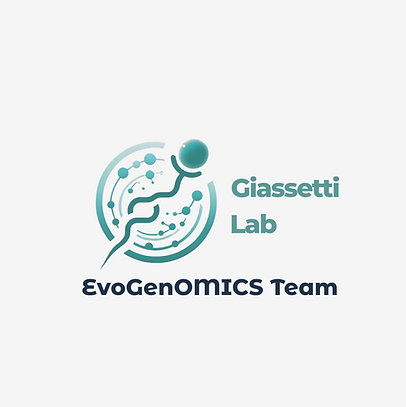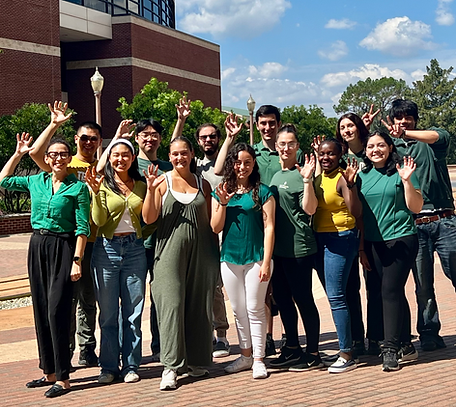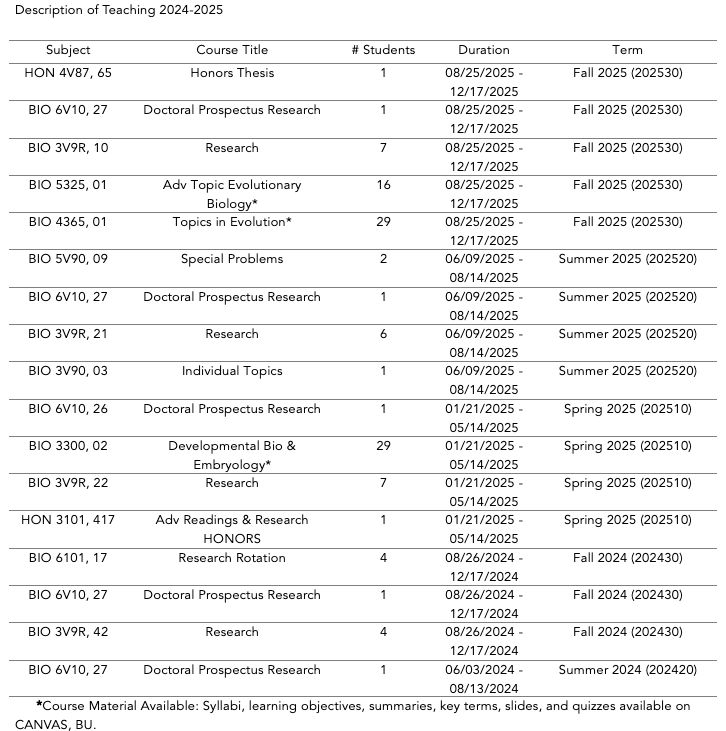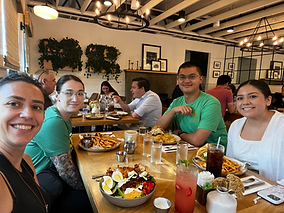Welcome
Visit our site to learn more about our research, stay updated on our discoveries, and find opportunities to join our team.



Our Research

Sperm production—known as spermatogenesis—is essential for reproduction and development, yet even minor disruptions can cause infertility. Our lab uses cutting-edge tools such as gene editing and integrative multi-omics analyses to uncover how spermatogenesis is intrinsically and extrinsically regulated at the molecular and cellular level across both model and non-model mammals.
But our work goes beyond basic biology. By deepening our understanding of these processes, we aim to drive real-world advances: improving infertility treatments for patients, protecting biodiversity, strengthening livestock genetics, and fueling innovation in biotechnology.



Evaluate the Molecular and Cellular Mechanisms of Male Germ Cell Fate of Development Through Phylogenetics.
The mammalian testis contains a diverse array of cell types essential for sperm production, including germ cells at various stages of development and supportive somatic cells. By comparing testicular cell populations and regulatory pathways across species, we aim to understand the initiation of meiosis and germ cell differentiation, as well as spermiogenesis.
Understanding the Intrinsic and Extrinsic Factors Influencing Male Infertility in Model and Non-Model Mammalian Species
Spermatogenesis relies on complex communication between germ cells and neighboring somatic cells. We're using advanced techniques, such as multi-omics analysis and CRISPR/Cas9 gene editing, to uncover the intrinsic and extrinsic pathways and interactions that drive sperm production. Our goal is to understand these mechanisms, pinpointing specific molecular regulators unique to germ cells. We then aim to replicate and manipulate these targets in laboratory settings or living organisms, applying these discoveries to enhance reproductive technologies and fertility.
Determine the Paternal Impact of Male Fertility and Early Embryonic Development in Animals
Paternal factors impact early embryonic development. We are using reproductive techniques like IVF, ICSI, and embryo culture to evaluate the paternal effect in mice and non-model species. We also analyze molecular pathways involved in paternal effects through transcriptomic and proteomic analyses. Our objective is to better understand the role of paternal factors in reproductive outcomes, which can impact fertility.








Publications
GIASSETTI, M.I., MIAO, D., LAW, N.C. ET AL. ARRDC5 expression is conserved in mammalian testes and required for normal sperm morphogenesis. Nat Commun 14, 2111 (2023). https://doi.org/10.1038/s41467-023-37735-y
CICCARELLI M, GIASSETTI M, MIAO M, OATLEY MJ, ROBBINS C, LOPEZ-BILADEAU B, WAQAS S, TIBARY A, WHITELAW B, LILLICO S, PARK CH, PARK KE, TELUGU B, FAN Z, LIU Y, REGOUSKI M, POLEJAEVA I, OATLEY JM. Donor-derived spermatogenesis following stem cell transplantation in sterile NANOS2 knockout males, PNAS, 2020 117 (39) 24195-24204; first published September 14, 2020; https://doi.org/10.1073/pnas.2010102117
DEQIANG MIAO, MARIANA IANELLO GIASSETTI, MICHELA CICCARELLI, BLANCA LOPEZ-BILADEAU, JON M OATLEY. Simplified pipelines for genetic engineering of mammalian embryos by CRISPR-Cas9 electroporation. Biology of Reproduction, Volume 101, Issue 1, July 2019, Pages 177–187, https://doi.org/10.1093/biolre/ioz075
MARIANA I. GIASSETTI, MICHELA CICCARELLI, AND JON M. OATLEY Spermatogonial Stem Cell Transplantation: Insights and Outlook for Domestic Animals. Annual Review of Animal Biosciences, Vol. 7:385-401 (Volume publication date February 2019), https://doi.org/10.1146/annurev-animal-020518-115239
CHRISTINE M. DEPOMPEO DVM MARIANA IANELLO GIASSETTI DVM, PHD MAHMOUD M. ELNAGGAR BVSC, MVSC, PHD JON M. OATLEY PHD WILLIAM C. DAVIS PHD BOEL A. FRANSSON DVM, PHD. Isolation of canine adipose‐derived mesenchymal stem cells from falciform tissue obtained via laparoscopic morcellation: A pilot study. Veterinary surgery, vol. 49, issue s1, 2018, https://doi.org/10.1111/vsu.13267
GOISSIS, M.D., GIASSETTI, M.I., WORST, R.A., MENDES, C.M., MOREIRA, P.V., ASSUMPÇÃO, M.E.O.A., VISINTIN, J.A. Spermatogonial stem cell potential of CXCR4-positive cells from pre-pubertal bovine testis, Anim. Repro. Sci. 2018 Sep;196:219-229. doi: 10.1016/j.anireprosci.2018.08.014.
GIASSETTI, M.I., DE BARROS, F.R.O., MENDES, C.M., GOISSIS, M.D., MARIA, F.S., SIQUEIRA, A.F.P., SIMÕES, R., ASSUMPÇÃO, M.E.A., VISINTIN, J.A. In vitro culture of ovine mammary gland cells expressing beta-lactoglobulin and beta-casein. Brazilian Journal of Veterinary Research and Animal Science, 54(2), 188-196. https://doi.org/10.11606/issn.1678-4456.bjvras.2017.125590
GIASSETTI, M.I., GOISSIS, M.D., DE BARROS, F.R.O., MOREIRA, P.V., ASSUMPÇÃO, M.E.O.A, VISINTIN, J.A. Effect of age on expression of spermatogonial markers in bovine testis and isolated cells, Animal Reproduction Science (DOI: 10.1016/j.anireprosci.2016.04.004)
GIASSETTI, M.I., GOISSIS, M.D., DE BARROS, F.R.O., BRUNO, A.H., ASSUMPÇÃO, M.E.O.A, VISINTIN, J.A. Comparison of spermatogonial stem cell markers after diverse differential plating methods of bovine testicular cells, Reproduction in Domestic Animals (doi: 10.1111/rda.12641).
MARQUES, M.G, DE BARROS, F.R.O., GOISSIS, M.D, GIASSETTI, M.I., ASSUMPÇÃO, M.E.O.A, VISINTIN, J.A. Effect of oocyte recovery techniques on in vitro production of swine embryos. Open Journal of Animal Sciences, In Press.Q
YANG, MI GIASSETTI, AD EALY. Fibroblast growth factors activate mitogen-activated protein kinase pathways to promote migration in ovine trophoblast cells, Reproduction, 141 (5) 707-714. 2011.
GIASSETTI, M. I.; PONTES, E. O.; NIEMEYER, C.; SIQUEIRA, A. F. P.; FEDOZZI, F.; LIMA, M.C.O; MARQUES, V.; BERTAN, C.M.; MIGLINO, M.A.; ARRUDA, R. P.; PAPA, P.C.; BINELLI, M. Characterization of interferon-tau protein expression during the critical period for the pregnancy recognition in cattle. Brazilian Journal of Veterinary Research and Animal Science, v. submit, p. 00-00, 2008.
NIEMEYER, C.; SIQUEIRA, A.F.P.; GIASSETTI, M.I.; PONTES, E.O.; FEDOZZI, F.; LIMA, M.C.O.; BERTAN, C.M.; ARRUDA, R.P.; MIGLINO, M.A.; BINELLI, M. Protein profile of uterine washings of cyclic and pregnant cows from days 14 to 18 post-estrus. Animal Reproduction, v. 4, p. 77-87, 2007.
Meet Mariana
Education
Ph.D., Biomedical Sciences and Biotechnology, School of Veterinary Medicine, University of Zaragoza – Zaragoza, Spain (2011-2015).
Ph.D., Reproductive Biology, School of Veterinary Medicine, University of Sao Paulo – Sao Paulo, Brazil (2011-2015).
Master of Science, Animal Reproduction, Veterinary Medicine, School of Veterinary Medicine, University of Sao Paulo – Sao Paulo, Brazil (2009-2011).
D.V.M. Degree, Veterinary Medicine, School of Veterinary Medicine - University of Sao Paulo – Sao Paulo, Brazil (2004- 2008).
Fluency: English, Spanish, and Portuguese
Biography
Dr. Mariana Ianello Giassetti is a veterinarian with a Ph.D. in Reproductive Biology from the University of São Paulo, Brazil, and Biomedical Sciences and Biotechnology from the University of Zaragoza, Spain. She leads a research group focused on phylogenetic multi-Omics analysis, male reproductive health, fertility, gene-edited animals, and the paternal influence on offspring.
Combining her veterinary background with a passion for biotechnology, Mariana pursued a Postdoctoral fellowship at Washington State University, studying spermatogenesis and embryogenesis, and honing skills in embryology, gene editing, genomics, and bioinformatics. Her primary focus is on the molecular mechanisms governing male fertility and mammal reproductive health, investigating spermatogenesis and paternal effects on development using CRISPR/Cas9 and multi-omics analysis. Mariana also fosters interdisciplinary collaborations bridging veterinary medicine, biotechnology, and embryology, and maintains strong partnerships across South and Central America, Europe, and Africa.
Previously, she worked as an embryologist in the Biotech Industry, applying Reproductive Techniques for endangered species and developing gene editing tools for mammoths, using techniques like Somatic Cell Nuclear Transfer (SCNT) and Intracytoplasmic Sperm Injection (ICSI) to initiate embryo development.
Teaching

Welcome to Our Lab

The Giassetti Lab occupies ~900 sq. ft. of positive-pressure tissue culture space on the second floor, A-wing, of Baylor’s Basic Science Building (BSB). Located in the research corridor, the lab sits alongside other Biology and CMHD faculty laboratories, including those of Drs. Joseph Taube, Jonathan Kelber, Dwayne Simmons, Leigh Greathouse, Aaron Wright, and Myeongwoo Lee.
Giassetti lab (Department of Biology - BSB A258) Equipment Inventory

-
3-Axis Course Micromanipulation Set (Narashige) – BSB A258 – Embryo micromanipulation and ICSI
-
3D Rotator Waver (VWR) – BSB A258 – General
-
Aitostainer 360 (Epredia) – BSB A258 – Automated immunohistochemistry
-
Analytical and Precision Balances (VWR) – BSB A258 – General
-
Biosafety Cabinet Class II A2 (VWR) – BSB A258 – Sterile processing
-
Cabinet Fridge (BSI) – BSB A258 – General
-
Centrifuge 5425 R (Eppendorf) – BSB A258 – General
-
Centrifuge 5804R (Eppendorf) – BSB A258 – General
-
Chemic Doc MP (Bio-Rad) – BSB A258 – Gel and blot imaging
-
Cryogenic Storage Vessels Biocane 34 (Thermo) – BSB A258 – Long-term sample storage
-
Digital General Purpose Water Bath (VWR) – BSB A258 – General
-
Electroporator and Cell Fusion BTX 2001 – BSB A258 – Gene editing of embryos and cells
-
Flex 3 Water Purification System (Purelab) – BSB A258 – General
-
Leica DM6000 Fluorescence Microscope – BSB A258 – High-resolution imaging, IHC
-
Horizontal Gel Electrophoresis Systems (VWR) – BSB A258 – DNA/RNA separation
-
Incubator CellXpert C170i (Eppendorf) – BSB A258 – Cell and embryo culture
-
Incubator CO2 (PHCBi) – BSB A258 – Cell and embryo culture
-
Mastercycler X40 (Eppendorf) – BSB A258 – General PCR
-
Microscope (Motic) – BSB A258 – General
-
Leica RM2125 RTS Microtome – BSB A258 – Histological sectioning
-
Mixer Motor for Pestle (VWR) – BSB A258 – General
-
Multi-Parameter Meters (VWR) – BSB A258 – pH/Conductivity/DO measurements
-
Oven (VWR) – BSB A258 – General
-
PCR Workstation (VWR) – BSB A258 – DNA/RNA handling
-
Power Supply 500V (VWR) – BSB A258 – General
-
Stereoscope (Motic) – BSB A258 – Embryo observation
-
Ultra Freezer (PHCBi) – BSB A258 – Storage
-
Vortex Mixer (VWR) – BSB A258 – General
-
Qubit and NanoDrop Systems – BSB A258 – Nucleic acid quantification
-
Mac Studio and Workstation PCs – BSB A258 – Bioinformatics, data analysis, image processing

Unique Research Capabilities: The Giassetti Lab at Baylor University utilizes state-of-the-art tools, including CRISPR gene editing, generation of model and non-model gene edited species, single-cell transcriptomics integration, and multi-omics analytics, to tackle crucial challenges at the intersection of basic science, reproduction, and the biomedical field. With a focus on gametogenesis in model and non-model mammals, the effects of embryogenesis on testis development, and predictive models of species resilience, the lab connects cutting-edge research with practical applications.
Baylor University/BSB - Collaborative Equipment Network for Teaching and Research (CENTR)
Center for Microscopy and Imaging
-
AFM (Atomic Force Microscope)
-
CLSM – Olympus (Confocal Laser Scanning Microscope)
-
CLSM – Zeiss
-
Computer Workstation
-
Critical Point Dryer
-
Cryomicrotome
-
EBL (Electron Beam Lithography)
-
FIB-SEM (Focused Ion Beam – Scanning Electron Microscope)
-
Fluorescence Microscope
-
Light Microscope
-
Sample Processor
-
Sputter Coater
-
Stereomicroscope
-
Tabletop SEM
-
TEM (Transmission Electron Microscope)
-
TEM (Spectra 3000)
-
TEM Single Electron Detector & EELS (Electron Energy Loss Spectroscopy)
-
Trimmer
-
Ultramicrotome
-
Vibrating Blade Microtome
Mass Spectrometry Center
-
Agilent ICP-MS 7900
-
Agilent LC-MS/MS 6420
-
Progensis Processing PC
-
Thermo DSQ-GC/MS
-
Thermo Orbitrap Discovery
-
Thermo Orbitrap Fusion
-
Thermo Orbitrap Q-Exactive
-
Thermo Processing PC
-
Thermo TSQ Evo 8000 GC-MS/MS
-
Waters Synapt G2S HDMS
-
Waters Xevo TQ-S
Molecular Biosciences Center
-
ABI QuantStudio 6 qPCR
-
Agilent 2100 Bioanalyzer
-
BD FACSMelody Cell Sorter
-
Beckman Avanti JXN-26 (centrifuge)
-
Beckman Optima XPN1000 (ultracentrifuge)
-
BioRad GelDoc EZ Imager
-
BioTek ELx800 Absorbance Plate Reader
-
Biotek Lionheart FX (imaging)
-
Thermo Varioskan LUX Multimode Plate Reader
-
BD FACSVerse Flow Cytometer
-
Cell Culture Facilities (multiple BSCs)
-
GE LAS 4000 Chemi Imager
-
GE Typhoon FLA9000 Phosphor/Fluoro Imager
Center for Nuclear Magnetic Resonance Spectroscopy (NMR)
-
Bruker 400 MHz NMR
-
Bruker 300 MHz Fourier NMR
-
Bruker 600 MHz NMR
-
Bruker EMX Plus EPR (Electron Paramagnetic Resonance)
-
Varian 500 MHz NMR
Instrumental Analysis & Chemical Stockroom
-
Agilent 100 HPLC
-
Atomic Absorption Spectrometer iCE3400
-
CH Instruments Electrochemistry Station
-
Fluorescence Spectrophotometer Hitachi 551
-
SCIEX P/ACE MDQ-Plus (capillary electrophoresis)
-
Thermo Ultimate 3000 HPLC
-
Thermo/Nicolet iS-10 FT-IR
-
UV-Visible Spectrometer Agilent 8453
-
Chemical Stockroom (shared resource)
Lab Safety
All lab safety records are maintained on the [SciShield] (login required). It is your responsibility to keep your training current; both you and I will receive notifications when retraining is needed.
In case of emergencies, please review the following documents:
-
Chemical Higine Plan
-
Laboratory Emergency Response Guide
-
Chemical Spill Instruction Sheet
-
Fire Extinguisher Notes
For chemical waste disposal, use the online waste pickup forms to request collection.
Quick Access Links:
-
Laboratory Emergency Response Guide
-
Chemical Spill Instruction Sheet
-
Fire Extinguisher Notes
Please learn more about BU Institutional Biosafety Committee using the link - https://universitycommittees.web.baylor.edu/committee-directory/institutional-biosafety-committee
Meet The EvoGenOMICs Team

Interested in joining our lab?
Contact Mariana Giassetti: mariana_giassetti@baylor.edu
Postdoctoral Researcher

I am Wilkister Nabulindo, a veterinarian and animal reproductive biologist specializing in reproductive biotechnology, stem cell culture, and genome editing. I earned my Doctorate from the University of Nairobi, Kenya, where my research focused on the generation of genetically edited surrogate sires (goats), involving spermatogonial stem cell culture and intratesticular transplantation. My research interests include in vitro embryo production (IVF and ICSI), genome editing, stem cell culture, and genomics in reproductive biology.
As a postdoctoral fellow, my current research explores the molecular mechanisms regulating early-stage mammalian development, with a particular focus on male reproductive development and spermatogenesis. I integrate phylogenetic multi-omics approaches to investigate fertility and its association with developmental biology.
Beyond research, I am passionate about mentoring students in STEM and advancing science policy to bridge research and global impact.
Doctoral Students and Candidates

My name is Melissa Patton, and I am a Graduate student at Baylor University in the Biology PhD program and an active member of the Giassetti lab studying topics related at male fertility and developmental biology. My educational background stems off a Bachelors in Biological science from Arizona State University along with a background in healthcare being licensed as a vocational nurse since 2013. I am Army retired and a mother of 3 amazing children which has not only given me an organized and structured mindset but the patience to maneuver my way through trials and errors in research. I am excited to spend each day digging deep into topics related to embryology, evolutionary medicine, and reproductive biology.

My name is Melanie L. Salas, and I earned my undergraduate degree in Biology with a minor in Philosophy from Syracuse University. During my studies, I conducted research under Dr. Latha Ramalingam and Dr. Alaji Bah, investigating the effects of fish oil supplementation on paternal obesity and its connection to the Fragile X Mental Retardation Protein (FMRP) in Fragile X Syndrome. Currently, as a Ph.D. student in Dr. Mariana Ianello Giassetti's lab at Baylor University, I am focused on cancer models and exploring an Evolutionary multiomics approach in mammals. My research delves into the molecular mechanisms of spermatogenesis across mammalian species, aiming to uncover insights into reproductive health and infertility..

My name is Qiyang, also known as Q. I’m an international student from Sichuan, China who is now pursuing a biology PhD degree at Baylor University. I received my bachelor’s degree from the University of Texas at Austin in 2022 (Hook 'em🤘). I then joined a cancer lab at Baylor College of Medicine for my post-bachelor research, where we studied the relationship between circadian disruption and liver cancer. I was fascinated by the topic of development biology in my undergraduate and would like to develop more in related fields during my PhD study.
Undergraduate Students
-
Julia McNeal, Biology Major (2021– 2025) – Enrolled in BIO 3V9R, Fall 2024 - Spring 2025
-
Om Patel, Biology Major (2022–2025) – Enrolled in BIO 3V9R, Fall 2024-Summer 2025
-
Paige Gosset (2021–2025) – Enrolled in BIO 3V9R, Fall 2024 – Spring 2025
-
Rhett Cox Rodabaugh (2022–2025) – Enrolled in BIO 3V9R, Fall 2024 – Spring 2025
-
Ava Kwan (2023–present) – Enrolled in BIO 3V9R, Spring 2025
-
Melissa Ratcliffe (2023–present) – Enrolled in BIO 3V9R, Spring 2025 - present
-
Peter Yao (2023–present) – Enrolled in BIO 3V9R, Spring 2025 – present
-
Ali Omar (2023–present) – Enrolled in BIO 3V9R, Summer 2025 – present
-
Enzo Henry (2023–present) – Enrolled in BIO 3V9R, Summer 2025 – present
-
Sophia Vega(2024–present) – Enrolled in BIO 3V9R, Summer 2025 – present
-
Zuleika Botello (2023–present) – Enrolled in BIO 3V9R, Summer 2025 – present
-
Ruth Gelista (2022–present) – Enrolled in BIO 3V9R and McNair Scholarship, Summer 2025 – present
-
Stella Park (2022–present) – Enrolled in BIO 3V9R, Fall 2025 – present











Honorary Members

We've been lucky to have Tica, Indy, and Duke as honorary members of our team since 2014.
We are hiring!
Join the EvoGenOMICS team as a Lab Manager in the Giassetti Lab at the Department of Biology. The role focuses on multi-omics integration, gene editing, and animal gametes & preimplantation embryos.
In the news:

"Dr. Mariana Giassetti is an assistant professor at Baylor and an expert in animal reproduction and biosciences. When it comes to the three dire wolf cubs, Giassetti argues that they may be like their ancient ancestors.
“The dire wolf that they have right now will not be a 100% match,” Giassett said. “That’s why it’s a functional de-extinction because we recreate the phenotypes. But they will have genes … that will create phenotypes that will resemble a dire wolf. Giassetti said this entire ordeal is closer to a “proof of concept” for Colossal Bioscience and that the company still has a long way to go in terms of their technology. But it’s a great place to start, she said.”
Webinars
IETS webinarshttps://www.iets.org/Foundation/Webinars
SSR webinars http://ssr.org/webinars/page/2/ASRM webinars https://connect.asrm.org/srbt/resources/webinars?ssopc=1
The International IVF Initiative webinarshttps://ivfmeeting.com/collections/lectures
ASA webinarhttps://andrologysociety.org/video-library/
Courses
Here is the link for the Frontier of Reproduction (FIR) that occurs every year in Woods Hole, MA.
Online Tools
Gene structure and descriptions:
GeneCards: https://www.genecards.org
Ensembl: http://useast.ensembl.org/index.html
NCBI: https://www.ncbi.nlm.nih.gov/gene/
Functional-OMICS and animal model descriptions:
UniProt: https://www.uniprot.orgExpression (RNA and protein)
Human RNA: https://www.gtexportal.org/home/
Human protein: https://www.proteinatlas.org
MGI: https://www.informatics.jax.org/javawi2/servlet/WIFetch?page=expressionQFexpandedKO models:
JAX https://www.informatics.jax.org/home/strainPathways:
Gene ontology:Panther: https://www.pantherdb.org
String https://string-db.org



